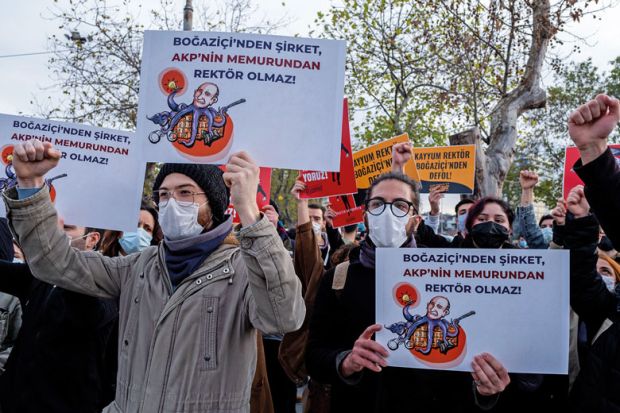The sacking of three elected deans from Boğaziçi University could signal a renewed attack on institutional autonomy and freedom of speech in Turkey’s universities, scholars have warned.
The dismissal of Özlem Berk Albachten, Metin Ercan and Yasemin Bayyurt by Turkey’s Higher Education Council (YOK) follows a tumultuous year at the leading Istanbul university, which has been riven by student protests since a loyalist to the country’s president, Recep Tayyip Erdoğan, was installed as rector in January 2021.
Since the appointment from outside Boğaziçi of Melih Bulu, a member of Mr Erdoğan’s Justice and Development Party who was accused of plagiarising his PhD, more than 600 student protesters have been arrested, and some of them face jail sentences of more than 30 years.
It is believed that the deans were made redundant because of their support for academics who criticised the appointment of Dr Bulu – who was later dismissed. Scholars have held a daily vigil to protest against his successor, Naci Inci, another Erdoğan supporter.
Their dismissal follows a sustained attack on academic freedom within Turkish universities in the wake of the 2016 attempted coup. In the years since that putsch, more than 6,000 academics have been sacked and about 3,000 schools and universities have been closed over alleged links to the movement led by exiled preacher Fethullah Gulen.
Several émigré Turkish scholars told Times Higher Education, however, that the most recent sackings at Boğaziçi were particularly troubling because they signalled that even mild political dissent would not be tolerated within universities.
“This latest event makes many educators like me hesitate to return and work in Turkey,” explained Boğaziçi graduate Elif Balin, now an assistant professor at San Francisco State University.
“This constant attack on institutional independence, academic freedom, job security and the right to peaceful protest, along with filling administrative and academic positions with non-elected and partisan members, makes many people – especially young people in Turkey – question the quality of their education and diminishes their hope for the future.”
“It is utterly heartbreaking and depressing to see my alma mater being attacked, dismantled and slowly torn into pieces,” said Devrim Umut Aslan, a lecturer at Lund University in Sweden.
Staff and students at Boğaziçi have protested against the latest dismissals, which Taner Bilgiç, a member of the executive board, described as seeming “more like a punishment given out to a university that has been standing up for its academic freedom and institutional autonomy for the past year”.
Zeynep Gambetti, associate professor in political science at Boğaziçi, said the removal of three deans who had fought to ensure that scholarly excellence trumped party loyalty would give the new president a “free hand in filling the university with below-par academics and in dismissing or crowding out critical faculty members”.
“Boğaziçi is sure to lose its stature as a centre of excellence and will become, like other universities in Turkey, an institution where fear and self-censorship are rampant,” he said.
“Things are looking very grim at the moment,” added Olcay Atik, a chemistry undergraduate, who is facing disciplinary action for protesting.
“With the removal of the three deans our academicians voted in, we are expecting a huge number of students to be wrongfully punished with little to no evidence…as deans get to make the final decisions.”
However, Gürkan Kumbaroğlu, vice-rector at Boğaziçi, contested the version of events put forward by the deans, stating that the university was “committed wholeheartedly to academic freedom and will always be in the vanguard of its defence”.
“However, academic freedom is not coterminous with pursuing a clandestine political agenda” and “with any freedom, there comes responsibility”, he told THE.
The three deans did “not hold their positions by virtue of a popular democratic mandate”, contended Professor Kumbaroğlu, who said that “by law, they are appointed to their post on the basis of a contract with the university by [Turkey’s Higher Education Council]”, which decided that “they had committed serious infractions resulting in clear breaches of their professional and academic obligations”.
The academics declined to take part in an investigation and did not submit representations in their defence, he added.
“They have, therefore, not been removed due to a putative assault on academic freedoms; indeed, we contend there is no evidence for this,” said Professor Kumbaroğlu. “They have been dismissed due to serious failures on their part in fulfilling their duties – it is unfortunate and inaccurate, therefore, that they wish to frame this as a political grievance.”
Register to continue
Why register?
- Registration is free and only takes a moment
- Once registered, you can read 3 articles a month
- Sign up for our newsletter
Subscribe
Or subscribe for unlimited access to:
- Unlimited access to news, views, insights & reviews
- Digital editions
- Digital access to THE’s university and college rankings analysis
Already registered or a current subscriber? Login








